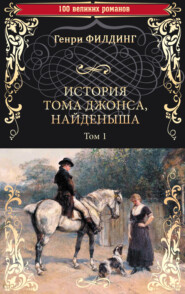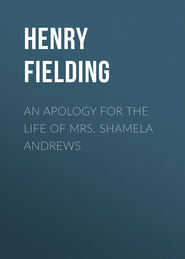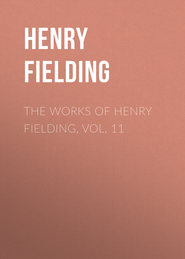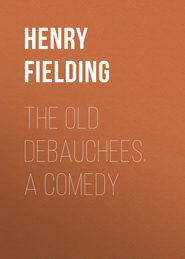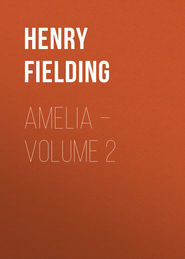По всем вопросам обращайтесь на: info@litportal.ru
(©) 2003-2024.
✖
Amelia – Volume 3
Настройки чтения
Размер шрифта
Высота строк
Поля
"I know he doth," cries the doctor, "and so Barnes tells us, in his note upon the place; but if you remember the rest of the quotation as well as you do that from Eustathius, you might have added the observation which Mr. Dryden makes in favour of this passage, that he found not in all the Latin authors, so admirable an instance of extensive humanity. You might have likewise remembered the noble sentiment with which Mr. Barnes ends his note, the sense of which is taken from the fifth chapter of Matthew: —
[Greek verse]
"It seems, therefore, as if this character rather became a Christian than a heathen, for Homer could not have transcribed it from any of his deities. Whom is it, therefore, we imitate by such extensive benevolence?"
"What a prodigious memory you have!" cries the old gentleman: "indeed, son, you must not contend with the doctor in these matters."
"I shall not give my opinion hastily," cries the son. "I know, again, what Mr. Poole, in his annotations, says on that verse of St Matthew – That it is only to heap coals of fire upon their heads. How are we to understand, pray, the text immediately preceding? —Love your enemies, bless them that curse you, do good to them that hate you."
"You know, I suppose, young gentleman," said the doctor, "how these words are generally understood. The commentator you mention, I think, tells us that love is not here to be taken in the strict sense, so as to signify the complacency of the heart; you may hate your enemies as God's enemies, and seek due revenge of them for his honour; and, for your own sakes too, you may seek moderate satisfaction of them; but then you are to love them with a love consistent with these things; that is to say, in plainer words, you are to love them and hate them, and bless and curse, and do them good and mischief."
"Excellent! admirable!" said the old gentleman; "you have a most inimitable turn to ridicule."
"I do not approve ridicule," said the son, "on such subjects."
"Nor I neither," cries the doctor; "I will give you my opinion, therefore, very seriously. The two verses taken together, contain a very positive precept, delivered in the plainest words, and yet illustrated by the clearest instance in the conduct of the Supreme Being; and lastly, the practice of this precept is most nobly enforced by the reward annexed —that ye may be the children, and so forth. No man who understands what it is to love, and to bless, and to do good, can mistake the meaning. But if they required any comment, the Scripture itself affords enow. If thine enemy hunger, feed him; if he thirst, give him drink; not rendering evil for evil, or railing for railing, but contrariwise, blessing. They do not, indeed, want the comments of men, who, when they cannot bend their mind to the obedience of Scripture, are desirous to wrest Scripture to a compliance with their own inclinations."
"Most nobly and justly observed," cries the old gentleman. "Indeed, my good friend, you have explained the text with the utmost perspicuity."
"But if this be the meaning," cries the son, "there must be an end of all law and justice, for I do not see how any man can prosecute his enemy in a court of justice."
"Pardon me, sir," cries the doctor. "Indeed, as an enemy merely, and from a spirit of revenge, he cannot, and he ought not to prosecute him; but as an offender against the laws of his country he may, and it is his duty so to do. Is there any spirit of revenge in the magistrates or officers of justice when they punish criminals? Why do such, ordinarily I mean, concern themselves in inflicting punishments, but because it is their duty? and why may not a private man deliver an offender into the hands of justice, from the same laudable motive? Revenge, indeed, of all kinds is strictly prohibited; wherefore, as we are not to execute it with our own hands, so neither are we to make use of the law as the instrument of private malice, and to worry each other with inveteracy and rancour. And where is the great difficulty in obeying this wise, this generous, this noble precept? If revenge be, as a certain divine, not greatly to his honour, calls it, the most luscious morsel the devil ever dropt into the mouth of a sinner, it must be allowed at least to cost us often extremely dear. It is a dainty, if indeed it be one, which we come at with great inquietude, with great difficulty, and with great danger. However pleasant it may be to the palate while we are feeding on it, it is sure to leave a bitter relish behind it; and so far, indeed, it may be called a luscious morsel, that the most greedy appetites are soon glutted, and the most eager longing for it is soon turned into loathing and repentance. I allow there is something tempting in its outward appearance, but it is like the beautiful colour of some poisons, from which, however they may attract our eyes, a regard to our own welfare commands us to abstain. And this is an abstinence to which wisdom alone, without any Divine command, hath been often found adequate, with instances of which the Greek and Latin authors everywhere abound. May not a Christian, therefore, be well ashamed of making a stumbling- block of a precept, which is not only consistent with his worldly interest, but to which so noble an incentive is proposed?"
The old gentleman fell into raptures at this speech, and, after making many compliments to the doctor upon it, he turned to his son, and told him he had an opportunity now of learning more in one day than he had learnt at the university in a twelvemonth.
The son replied, that he allowed the doctrine to be extremely good in general, and that he agreed with the greater part; "but I must make a distinction," said he. However, he was interrupted from his distinction at present, for now Booth returned with Amelia and the children.
Chapter ix.
A scene of modern wit and humour
In the afternoon the old gentleman proposed a walk to Vauxhall, a place of which, he said, he had heard much, but had never seen it.
The doctor readily agreed to his friend's proposal, and soon after ordered two coaches to be sent for to carry the whole company. But when the servant was gone for them Booth acquainted the doctor that it was yet too early. "Is it so?" said the doctor; "why, then, I will carry you first to one of the greatest and highest entertainments in the world."
The children pricked up their ears at this, nor did any of the company guess what he meant; and Amelia asked what entertainment he could carry them to at that time of day?
"Suppose," says the doctor, "I should carry you to court."
"At five o'clock in the afternoon!" cries Booth.
"Ay, suppose I should have interest enough to introduce you into the presence."
"You are jesting, dear sir," cries Amelia.
"Indeed, I am serious," answered the doctor. "I will introduce you into that presence, compared to whom the greatest emperor on the earth is many millions of degrees meaner than the most contemptible reptile is to him. What entertainment can there be to a rational being equal to this? Was not the taste of mankind most wretchedly depraved, where would the vain man find an honour, or where would the love of pleasure propose so adequate an object as divine worship? with what ecstasy must the contemplation of being admitted to such a presence fill the mind! The pitiful courts of princes are open to few, and to those only at particular seasons; but from this glorious and gracious presence we are none of us, and at no time excluded."
The doctor was proceeding thus when the servant returned, saying the coaches were ready; and the whole company with the greatest alacrity attended the doctor to St James's church.
When the service was ended, and they were again got into their coaches, Amelia returned the doctor many thanks for the light in which he had placed divine worship, assuring him that she had never before had so much transport in her devotion as at this time, and saying she believed she should be the better for this notion he had given her as long as she lived.
The coaches being come to the water-side, they all alighted, and, getting into one boat, proceeded to Vauxhall.
The extreme beauty and elegance of this place is well known to almost every one of my readers; and happy is it for me that it is so, since to give an adequate idea of it would exceed my power of description. To delineate the particular beauties of these gardens would, indeed, require as much pains, and as much paper too, as to rehearse all the good actions of their master, whose life proves the truth of an observation which I have read in some ethic writer, that a truly elegant taste is generally accompanied with an excellency of heart; or, in other words, that true virtue is, indeed, nothing else but true taste.
Here our company diverted themselves with walking an hour or two before the music began. Of all the seven, Booth alone had ever been here before; so that, to all the rest, the place, with its other charms, had that of novelty. When the music played, Amelia, who stood next to the doctor, said to him in a whisper, "I hope I am not guilty of profaneness; but, in pursuance of that chearful chain of thoughts with which you have inspired me this afternoon, I was just now lost in a reverie, and fancied myself in those blissful mansions which we hope to enjoy hereafter. The delicious sweetness of the place, the enchanting charms of the music, and the satisfaction which appears in every one's countenance, carried my soul almost to heaven in its ideas. I could not have, indeed, imagined there had been anything like this in this world."
The doctor smiled, and said, "You see, dear madam, there may be pleasures of which you could conceive no idea till you actually enjoyed them."
And now the little boy, who had long withstood the attractions of several cheesecakes that passed to and fro, could contain no longer, but asked his mother to give him one, saying, "I am sure my sister would be glad of another, though she is ashamed to ask." The doctor, overhearing the child, proposed that they should all retire to some place where they might sit down and refresh themselves; which they accordingly did. Amelia now missed her husband; but, as she had three men in her company, and one of them was the doctor, she concluded herself and her children to be safe, and doubted not but that Booth would soon find her out.
They now sat down, and the doctor very gallantly desired Amelia to call for what she liked. Upon which the children were supplied with cakes, and some ham and chicken were provided for the rest of the company; with which while they were regaling themselves with the highest satisfaction, two young fellows walking arm-in-arm, came up, and when they came opposite to Amelia they stood still, staring Amelia full in the face, and one of them cried aloud to the other, "D – n me, my lord, if she is not an angel!" – My lord stood still, staring likewise at her, without speaking a word; when two others of the same gang came up, and one of them cried, "Come along, Jack, I have seen her before; but she is too well manned already. Three – are enough for one woman, or the devil is in it!"
"D – n me," says he that spoke first, and whom they called Jack, "I will have a brush at her if she belonged to the whole convocation." And so saying, he went up to the young clergyman, and cried, "Doctor, sit up a little, if you please, and don't take up more room in a bed than belongs to you." At which words he gave the young man a push, and seated himself down directly over against Amelia, and, leaning both his elbows on the table, he fixed his eyes on her in a manner with which modesty can neither look nor bear to be looked at.
Amelia seemed greatly shocked at this treatment; upon which the doctor removed her within him, and then, facing the gentleman, asked him what he meant by this rude behaviour? – Upon which my lord stept up and said, "Don't be impertinent, old gentleman. Do you think such fellows as you are to keep, d – n me, such fine wenches, d – n me, to yourselves, d – n me?"
"No, no," cries Jack, "the old gentleman is more reasonable. Here's the fellow that eats up the tithe-pig. Don't you see how his mouth waters at her? Where's your slabbering bib?" For, though the gentleman had rightly guessed he was a clergyman, yet he had not any of those insignia on with which it would have been improper to have appeared there.
"Such boys as you," cries the young clergyman, "ought to be well whipped at school, instead of being suffered to become nuisances in society."
"Boys, sir!" says Jack; "I believe I am as good a man as yourself, Mr. – , and as good a scholar too. Bos fur sus quotque sacerdos. Tell me what's next. D – n me, I'll hold you fifty pounds you don't tell me what's next."
"You have him, Jack," cries my lord. "It is over with him, d – n me! he can't strike another blow."
"If I had you in a proper place," cries the clergyman, "you should find I would strike a blow, and a pretty hard one too."
"There," cries my lord, "there is the meekness of the clergyman – there spoke the wolf in sheep's clothing. D – n me, how big he looks! You must be civil to him, faith! or else he will burst with pride."
"Ay, ay," cries Jack," let the clergy alone for pride; there's not a lord in the kingdom now hath half the pride of that fellow."
"Pray, sir," cries the doctor, turning to the other, "are you a lord?"
"Yes, Mr. – ," cries he, "I have that honour, indeed."
"And I suppose you have pride too," said the doctor.
"I hope I have, sir," answered he, "at your service."
"If such a one as you, sir," cries the doctor, "who are not only a scandal to the title you bear as a lord, but even as a man, can pretend to pride, why will you not allow it to a clergyman? I suppose, sir, by your dress, you are in the army? and, by the ribbon in your hat, you seem to be proud of that too. How much greater and more honourable is the service in which that gentleman is enlisted than yours! Why then should you object to the pride of the clergy, since the lowest of the function is in reality every way so much your superior?"
"Tida Tidu Tidum," cries my lord.
"However, gentlemen," cries the doctor, "if you have the least pretension to that name, I beg you will put an end to your frolic; since you see it gives so much uneasiness to the lady. Nay, I entreat you for your own sakes, for here is one coming who will talk to you in a very different stile from ours."
"One coming!" cries my lord; "what care I who is coming?"
"I suppose it is the devil," cries Jack; "for here are two of his livery servants already."
[Greek verse]
"It seems, therefore, as if this character rather became a Christian than a heathen, for Homer could not have transcribed it from any of his deities. Whom is it, therefore, we imitate by such extensive benevolence?"
"What a prodigious memory you have!" cries the old gentleman: "indeed, son, you must not contend with the doctor in these matters."
"I shall not give my opinion hastily," cries the son. "I know, again, what Mr. Poole, in his annotations, says on that verse of St Matthew – That it is only to heap coals of fire upon their heads. How are we to understand, pray, the text immediately preceding? —Love your enemies, bless them that curse you, do good to them that hate you."
"You know, I suppose, young gentleman," said the doctor, "how these words are generally understood. The commentator you mention, I think, tells us that love is not here to be taken in the strict sense, so as to signify the complacency of the heart; you may hate your enemies as God's enemies, and seek due revenge of them for his honour; and, for your own sakes too, you may seek moderate satisfaction of them; but then you are to love them with a love consistent with these things; that is to say, in plainer words, you are to love them and hate them, and bless and curse, and do them good and mischief."
"Excellent! admirable!" said the old gentleman; "you have a most inimitable turn to ridicule."
"I do not approve ridicule," said the son, "on such subjects."
"Nor I neither," cries the doctor; "I will give you my opinion, therefore, very seriously. The two verses taken together, contain a very positive precept, delivered in the plainest words, and yet illustrated by the clearest instance in the conduct of the Supreme Being; and lastly, the practice of this precept is most nobly enforced by the reward annexed —that ye may be the children, and so forth. No man who understands what it is to love, and to bless, and to do good, can mistake the meaning. But if they required any comment, the Scripture itself affords enow. If thine enemy hunger, feed him; if he thirst, give him drink; not rendering evil for evil, or railing for railing, but contrariwise, blessing. They do not, indeed, want the comments of men, who, when they cannot bend their mind to the obedience of Scripture, are desirous to wrest Scripture to a compliance with their own inclinations."
"Most nobly and justly observed," cries the old gentleman. "Indeed, my good friend, you have explained the text with the utmost perspicuity."
"But if this be the meaning," cries the son, "there must be an end of all law and justice, for I do not see how any man can prosecute his enemy in a court of justice."
"Pardon me, sir," cries the doctor. "Indeed, as an enemy merely, and from a spirit of revenge, he cannot, and he ought not to prosecute him; but as an offender against the laws of his country he may, and it is his duty so to do. Is there any spirit of revenge in the magistrates or officers of justice when they punish criminals? Why do such, ordinarily I mean, concern themselves in inflicting punishments, but because it is their duty? and why may not a private man deliver an offender into the hands of justice, from the same laudable motive? Revenge, indeed, of all kinds is strictly prohibited; wherefore, as we are not to execute it with our own hands, so neither are we to make use of the law as the instrument of private malice, and to worry each other with inveteracy and rancour. And where is the great difficulty in obeying this wise, this generous, this noble precept? If revenge be, as a certain divine, not greatly to his honour, calls it, the most luscious morsel the devil ever dropt into the mouth of a sinner, it must be allowed at least to cost us often extremely dear. It is a dainty, if indeed it be one, which we come at with great inquietude, with great difficulty, and with great danger. However pleasant it may be to the palate while we are feeding on it, it is sure to leave a bitter relish behind it; and so far, indeed, it may be called a luscious morsel, that the most greedy appetites are soon glutted, and the most eager longing for it is soon turned into loathing and repentance. I allow there is something tempting in its outward appearance, but it is like the beautiful colour of some poisons, from which, however they may attract our eyes, a regard to our own welfare commands us to abstain. And this is an abstinence to which wisdom alone, without any Divine command, hath been often found adequate, with instances of which the Greek and Latin authors everywhere abound. May not a Christian, therefore, be well ashamed of making a stumbling- block of a precept, which is not only consistent with his worldly interest, but to which so noble an incentive is proposed?"
The old gentleman fell into raptures at this speech, and, after making many compliments to the doctor upon it, he turned to his son, and told him he had an opportunity now of learning more in one day than he had learnt at the university in a twelvemonth.
The son replied, that he allowed the doctrine to be extremely good in general, and that he agreed with the greater part; "but I must make a distinction," said he. However, he was interrupted from his distinction at present, for now Booth returned with Amelia and the children.
Chapter ix.
A scene of modern wit and humour
In the afternoon the old gentleman proposed a walk to Vauxhall, a place of which, he said, he had heard much, but had never seen it.
The doctor readily agreed to his friend's proposal, and soon after ordered two coaches to be sent for to carry the whole company. But when the servant was gone for them Booth acquainted the doctor that it was yet too early. "Is it so?" said the doctor; "why, then, I will carry you first to one of the greatest and highest entertainments in the world."
The children pricked up their ears at this, nor did any of the company guess what he meant; and Amelia asked what entertainment he could carry them to at that time of day?
"Suppose," says the doctor, "I should carry you to court."
"At five o'clock in the afternoon!" cries Booth.
"Ay, suppose I should have interest enough to introduce you into the presence."
"You are jesting, dear sir," cries Amelia.
"Indeed, I am serious," answered the doctor. "I will introduce you into that presence, compared to whom the greatest emperor on the earth is many millions of degrees meaner than the most contemptible reptile is to him. What entertainment can there be to a rational being equal to this? Was not the taste of mankind most wretchedly depraved, where would the vain man find an honour, or where would the love of pleasure propose so adequate an object as divine worship? with what ecstasy must the contemplation of being admitted to such a presence fill the mind! The pitiful courts of princes are open to few, and to those only at particular seasons; but from this glorious and gracious presence we are none of us, and at no time excluded."
The doctor was proceeding thus when the servant returned, saying the coaches were ready; and the whole company with the greatest alacrity attended the doctor to St James's church.
When the service was ended, and they were again got into their coaches, Amelia returned the doctor many thanks for the light in which he had placed divine worship, assuring him that she had never before had so much transport in her devotion as at this time, and saying she believed she should be the better for this notion he had given her as long as she lived.
The coaches being come to the water-side, they all alighted, and, getting into one boat, proceeded to Vauxhall.
The extreme beauty and elegance of this place is well known to almost every one of my readers; and happy is it for me that it is so, since to give an adequate idea of it would exceed my power of description. To delineate the particular beauties of these gardens would, indeed, require as much pains, and as much paper too, as to rehearse all the good actions of their master, whose life proves the truth of an observation which I have read in some ethic writer, that a truly elegant taste is generally accompanied with an excellency of heart; or, in other words, that true virtue is, indeed, nothing else but true taste.
Here our company diverted themselves with walking an hour or two before the music began. Of all the seven, Booth alone had ever been here before; so that, to all the rest, the place, with its other charms, had that of novelty. When the music played, Amelia, who stood next to the doctor, said to him in a whisper, "I hope I am not guilty of profaneness; but, in pursuance of that chearful chain of thoughts with which you have inspired me this afternoon, I was just now lost in a reverie, and fancied myself in those blissful mansions which we hope to enjoy hereafter. The delicious sweetness of the place, the enchanting charms of the music, and the satisfaction which appears in every one's countenance, carried my soul almost to heaven in its ideas. I could not have, indeed, imagined there had been anything like this in this world."
The doctor smiled, and said, "You see, dear madam, there may be pleasures of which you could conceive no idea till you actually enjoyed them."
And now the little boy, who had long withstood the attractions of several cheesecakes that passed to and fro, could contain no longer, but asked his mother to give him one, saying, "I am sure my sister would be glad of another, though she is ashamed to ask." The doctor, overhearing the child, proposed that they should all retire to some place where they might sit down and refresh themselves; which they accordingly did. Amelia now missed her husband; but, as she had three men in her company, and one of them was the doctor, she concluded herself and her children to be safe, and doubted not but that Booth would soon find her out.
They now sat down, and the doctor very gallantly desired Amelia to call for what she liked. Upon which the children were supplied with cakes, and some ham and chicken were provided for the rest of the company; with which while they were regaling themselves with the highest satisfaction, two young fellows walking arm-in-arm, came up, and when they came opposite to Amelia they stood still, staring Amelia full in the face, and one of them cried aloud to the other, "D – n me, my lord, if she is not an angel!" – My lord stood still, staring likewise at her, without speaking a word; when two others of the same gang came up, and one of them cried, "Come along, Jack, I have seen her before; but she is too well manned already. Three – are enough for one woman, or the devil is in it!"
"D – n me," says he that spoke first, and whom they called Jack, "I will have a brush at her if she belonged to the whole convocation." And so saying, he went up to the young clergyman, and cried, "Doctor, sit up a little, if you please, and don't take up more room in a bed than belongs to you." At which words he gave the young man a push, and seated himself down directly over against Amelia, and, leaning both his elbows on the table, he fixed his eyes on her in a manner with which modesty can neither look nor bear to be looked at.
Amelia seemed greatly shocked at this treatment; upon which the doctor removed her within him, and then, facing the gentleman, asked him what he meant by this rude behaviour? – Upon which my lord stept up and said, "Don't be impertinent, old gentleman. Do you think such fellows as you are to keep, d – n me, such fine wenches, d – n me, to yourselves, d – n me?"
"No, no," cries Jack, "the old gentleman is more reasonable. Here's the fellow that eats up the tithe-pig. Don't you see how his mouth waters at her? Where's your slabbering bib?" For, though the gentleman had rightly guessed he was a clergyman, yet he had not any of those insignia on with which it would have been improper to have appeared there.
"Such boys as you," cries the young clergyman, "ought to be well whipped at school, instead of being suffered to become nuisances in society."
"Boys, sir!" says Jack; "I believe I am as good a man as yourself, Mr. – , and as good a scholar too. Bos fur sus quotque sacerdos. Tell me what's next. D – n me, I'll hold you fifty pounds you don't tell me what's next."
"You have him, Jack," cries my lord. "It is over with him, d – n me! he can't strike another blow."
"If I had you in a proper place," cries the clergyman, "you should find I would strike a blow, and a pretty hard one too."
"There," cries my lord, "there is the meekness of the clergyman – there spoke the wolf in sheep's clothing. D – n me, how big he looks! You must be civil to him, faith! or else he will burst with pride."
"Ay, ay," cries Jack," let the clergy alone for pride; there's not a lord in the kingdom now hath half the pride of that fellow."
"Pray, sir," cries the doctor, turning to the other, "are you a lord?"
"Yes, Mr. – ," cries he, "I have that honour, indeed."
"And I suppose you have pride too," said the doctor.
"I hope I have, sir," answered he, "at your service."
"If such a one as you, sir," cries the doctor, "who are not only a scandal to the title you bear as a lord, but even as a man, can pretend to pride, why will you not allow it to a clergyman? I suppose, sir, by your dress, you are in the army? and, by the ribbon in your hat, you seem to be proud of that too. How much greater and more honourable is the service in which that gentleman is enlisted than yours! Why then should you object to the pride of the clergy, since the lowest of the function is in reality every way so much your superior?"
"Tida Tidu Tidum," cries my lord.
"However, gentlemen," cries the doctor, "if you have the least pretension to that name, I beg you will put an end to your frolic; since you see it gives so much uneasiness to the lady. Nay, I entreat you for your own sakes, for here is one coming who will talk to you in a very different stile from ours."
"One coming!" cries my lord; "what care I who is coming?"
"I suppose it is the devil," cries Jack; "for here are two of his livery servants already."







